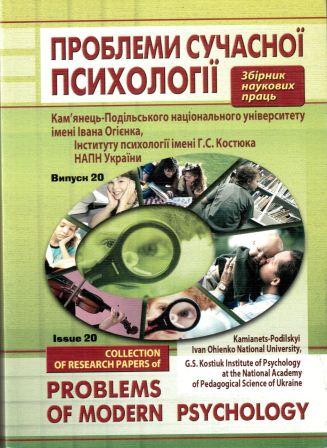Особливості соціально-психологічної компетентності молодших підлітків із затримкою психічного розвитку
DOI:
https://doi.org/10.32626/2227-6246.2013-20.%25pKeywords:
діти із затримкою психічного розвитку, молодші підлітки, компоненти соціально-психологічної компетентності.Abstract
Стаття присвячена вивченню особливостей формування компонентів
соціально-психологічної компетентності молодших підлітків із ЗПР спе-
ціальної школи, в порівнянні з однолітками, що нормально розвивають-
ся. Охарактеризовано зміст кожного з компонентів соціально-психоло-
гічної компетентності. Розглянуто цілі та завдання психодіагностичних
методик, які було підібрано для організації дослідження компонентів со-
ціально-психологічної компетентності. Проаналізовано результати фор-
мування структурних компонентів соціально-психологічної компетент-
ності молодших підлітків із затримкою психічного розвитку, отриманих
в ході констатувального експерименту, яке мало декілька етапів.
References
Альманах психологических тестов. – М.: КСП, 1996. – 400 с.
Калинина Н.В. Формирование социальной компетентности
как механизм укрепления психического здоровья подраста-
ющего поколения / Н.В. Калинина // Психологическая на-
ука и образование. – 2001. – №4. – С. 16 -21.
Никишина В.Б. Практическая психология в работе с детьми
с задержкой психического развития: Пособие для психоло-
гов и педагогов / В.Б. Никишина – М.: Гуманит. изд. центр
ВЛАДОС, 2003. – 128 с.
Практикум по возрастной психологии / [ред. Л.А. Головей,
Е.Ф. Рыбалко]. – СПб., 2001. – 688 с.
Современный словарь иностранных слов: 20000 слов, – СПб.:
Дуэт, 1994. – 752 с.
Downloads
How to Cite
Issue
Section
License
Copyright
The Editorial Board has the full right to publish original scientific papers containing results of theoretical and experimental research works which are not currently subject to review for publication in other scientific editions. The Author shall transfer to the editorial board of the Collection the right to spread the electronic version of the paper, as well as the electronic version of the paper translated into English (for papers originally submitted in Ukrainian and Russian) by all kinds of electronic means (placement at the official website of the Collection, electronic databases, repositories etc).
The Author of an article reserves the right to use materials of the paper, without approval with the editorial board and the founders of this Collection: a) partially or fully, for educational purposes; b) for writing own dissertation papers; c) for preparation of abstracts, conference reports and presentations.
The Author of an article can place electronic copies of the paper (including the final electronic version downloaded from the official website of the Collection) at:
- personal web resources of all Authors (websites, webpages, blogs etc.);
- web resources of the institutions where the Authors are employed (including electronic institutional repositories);
- non-profit public access web resources (for example, arXiv.org).
But in all cases, it is obligatory to have a bibliographic reference to the paper, or a hyperlink to its electronic copy placed at the official website of this Collection.






